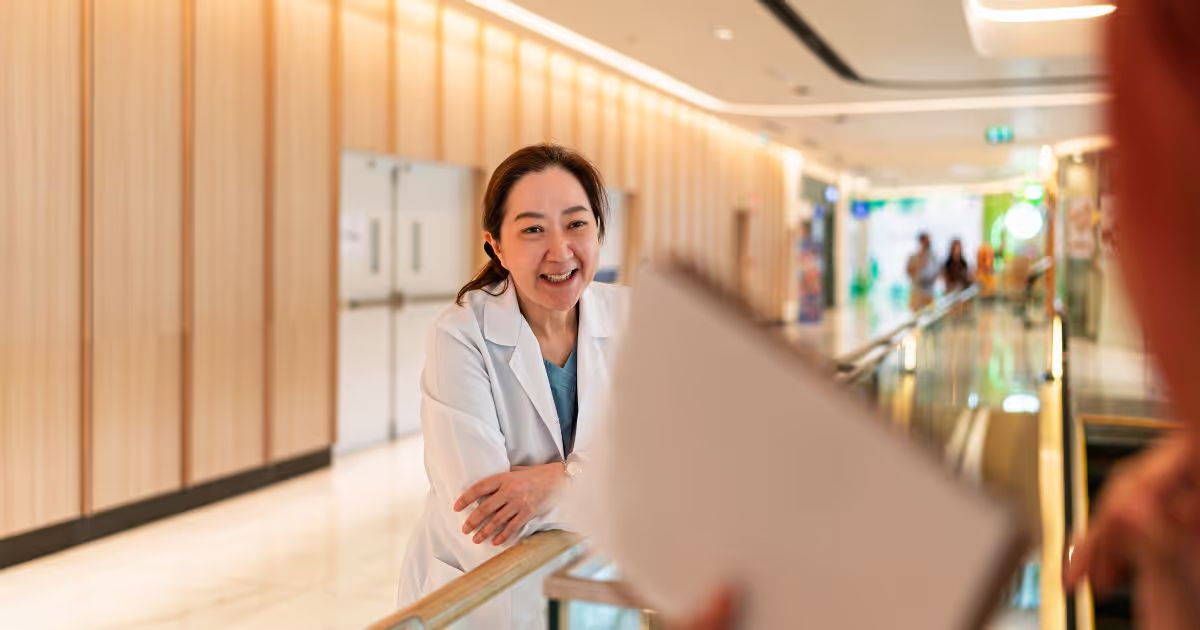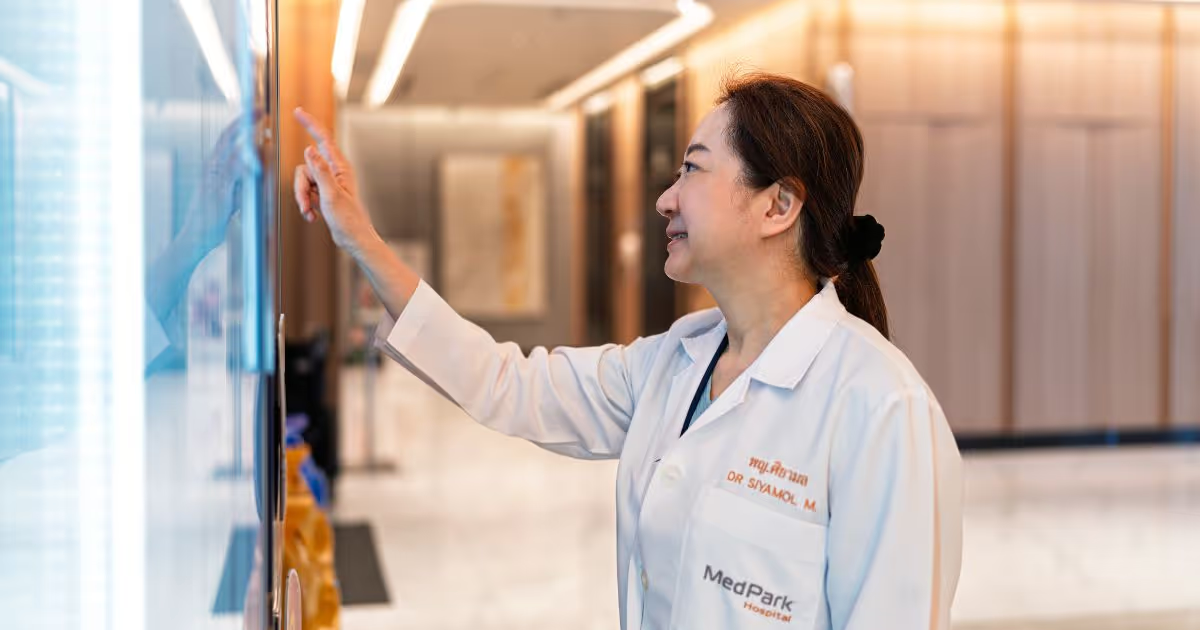Oncologists: Compassionate Companions Through Every Stage of Cancer for the Best Possible Quality of Life
“Terminal cancer” often evokes fear and despair in patients and their loved ones. Yet, many tend to overlook the fact that today’s medical advancements have brought new hope, extending survival while improving the quality of life. Confronting such a formidable malady calls for highly skilled oncologists - frontline specialists who care for patients at every stage.
Oncology uniquely involves long-term patient care, often spanning many years or even encompassing end-of-life support. In this role, oncologists double as trusted companions who guide patients through a trying journey with dignity and ease.
In this episode of MedPark Stories, oncologist Dr. Siyamol Mingmalairak discusses her experiences in cancer care and the personal practices she falls back on to maintain balance and find relaxation amidst challenges.

A Great Oncologist Cares Holistically—from the Beginning to the End of a Patient’s Journey
Dr. Siyamol was drawn to oncology because its holistic and integrative treatment approaches align with her interests and values, maximizing the effectiveness of patient care.
“An oncologist accompanies patients from the very beginning until the very end of their lives. You could say we care for each other until either one of us is gone. The long-term continuity of care feels like making a pact to fight through it together.”
Many patients are readily curable, but for those whose cancer is already at an advanced stage, the goal shifts to helping them live as long and as well as possible. This goal, too, is part of her mission as an oncologist.
“Cancer can be an incredibly challenging disease, starting with helping patients understand what it means. Some, upon hearing their diagnosis, immediately reject treatment altogether because they fear it will only make their lives worse. That’s where the oncologist’s work begins. We have to convince the patient to embrace the treatment.”
Cancer Is Not the End. Early Detection Increases the Chance of a Cure.
“Cancer is a disease that affects people globally. Our knowledge and treatment technologies are constantly evolving. As a doctor, I must keep pace, continuously learning and applying the latest advances to best care for my patients.”
She explains that cancer, like many other illnesses, includes types that are readily as curable as appendicitis. On the other hand, when the disease has spread or coexists with the patient’s chronic conditions, the treatment approach needs to be tailored accordingly. Each case is unique, and oncologists must develop personalized care plans that address those differences, whether subtle or significant.
“For those who feel hopeless upon a diagnosis and think, ‘This is it. I’m going to die today,’ that’s not the case. Most cancer patients don’t have their lives cut short abruptly. Many live for years because there are so many treatment options available today, which can cure the disease or help extend life meaningfully.”
Many people are not aware medical advances have dramatically improved the efficacy of cancer management compared to previous eras. Comprehensive screening and expedited diagnostic modalities, including hematologic assays, advanced imaging techniques, and genomic profiling, can reveal a person’s risk of developing specific types of cancer, allowing them to take preventive action before the disease even begins. The earlier cancer is detected, the greater the chance of achieving a complete cure.
“As for treatments, there are now far more surgical options available. “Minimally invasive surgeries are less painful and allow for quicker recovery. With many new drug formulations entering clinical practice, it is a challenge for doctors to keep up with the litany of names! With continued pharmaceutical research, these treatments are becoming more effective and applicable to a broader range of cancers. What was erstwhile difficult to treat is now much more manageable.”
“Side effects have also become easier to manage. We now have highly effective methods to control them. Antiemetic drugs can eliminate nausea and vomiting in some chemotherapy patients. In addition, a broad range of medical nutritional supplements is now available, allowing us to tailor nutritional support for patients experiencing appetite loss or inadequate nutrient intake during their treatment, ensuring patients meet their dietary needs.”
Comprehensive Cancer Care at MedPark: Everything Patients Need, All in One Place
As an oncologist, Dr. Siyamol Mingmalairak explains that one of MedPark Hospital’s greatest strengths lies in its ability to offer truly comprehensive cancer care. The hospital is fully equipped with everything a cancer patient may need, including cutting-edge medical technologies, with ongoing refinement, a team of experienced specialists, and multidisciplinary healthcare professionals.
“When everything is in place, there are no limitations hindering diagnosis, treatment planning, or patient care under varying conditions. Patients can receive care that is truly tailored to their needs, with the potential not only to preserve the quality of life but also to save lives. In such a setting, cancer becomes a manageable illness rather than a source of fear.”
Beyond this readiness, what is equally essential is empathy. An oncologist must approach patients and their families with a deep understanding. Feelings of fear and anxiety are natural, and it is the doctor’s responsibility to guide, inform, and reassure them with compassion.
“Because the moment a patient agrees to undergo treatment, it means they are entrusting us with their life.”

How an Oncologist Heals from Stress—Through the Simple Joy of Hobbies
Cancer care is complex, ongoing, and emotionally taxing. Oncologists need ways to unwind. And for Dr. Siyamol, that means turning to hobbies she enjoys in her free time. Outside of her role in caring for cancer patients, she embraces a simple lifestyle, often spending her leisure hours cooking, baking, making drinks, sewing, or tending to plants.
“When I come across tutorial clips on TikTok, I love trying them out. I once dreamed of owning a food brand. But with limited time and no business experience, I never really pursued it as a serious venture.”
For her, cooking and crafting not only bring joy but also cultivate mindfulness and concentration. Completing a project brings a sense of pride and happiness. When the result turns out well, whether it’s a beautiful craft or a delicious meal, it boosts confidence and personal satisfaction.
When asked if she had any parting words for those recently diagnosed with cancer or for anxious family members who are feeling overwhelmed or uncertain about pursuing treatment, Dr. Siyamol offered this heartfelt message before concluding the interview:
“Cancer doesn’t mean immediate death. The disease progresses in stages, and early-stage cancer often has a high chance of being completely cured. Even for those who require chemotherapy, treatment doesn’t go on indefinitely—most chemotherapy regimens last around six months. And side effects are no longer as frightening as they once were. If you want to live another 7 to 10 years, if you still want to pursue your dreams and make the most out of life, give us six months—let your doctors take care of you. Trust us. It’ll be over before you know it. Refusing treatment could mean missing out on many more years of a good, meaningful life.”
With cancer now more treatable and manageable than ever and survival rates steadily improving, there is no reason to lose hope.

